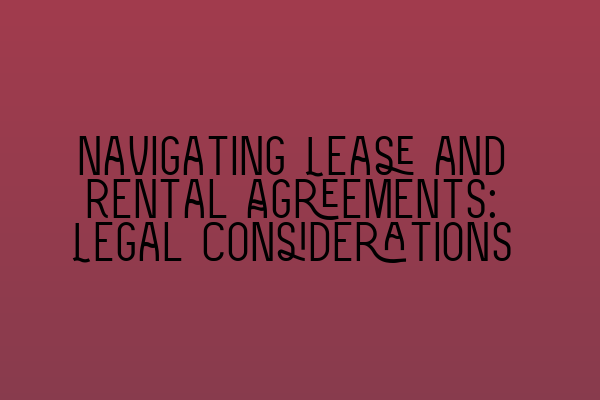Navigating Lease and Rental Agreements: Legal Considerations
When it comes to leasing or renting a property, it is essential to understand the legalities involved to protect your rights and ensure a smooth tenancy. Lease and rental agreements form the foundation of the landlord-tenant relationship and outline the rights, obligations, and responsibilities of both parties.
In this blog post, we will explore the legal considerations that tenants and landlords need to keep in mind when entering into lease and rental agreements. Whether you are a tenant looking for the perfect place to live or a landlord seeking to protect your investment, this guide will provide valuable insights to help you navigate the complexities of lease and rental agreements.
1. Understanding the Types of Agreements
Lease and rental agreements can come in various forms, including fixed-term leases, month-to-month rentals, and periodic leases. It is crucial to understand the differences between these agreements to determine which one suits your needs best. For a detailed understanding of the different types of agreements, check out our related article, “Mentorship for Aspiring Solicitors: Nurturing Talent in the Legal Field.”
2. Reviewing the Terms and Conditions
Before signing any lease or rental agreement, it is imperative to carefully review the terms and conditions outlined in the contract. Pay close attention to clauses regarding rent payments, maintenance responsibilities, pet policies, subletting, and termination procedures. A thorough understanding of these terms will help prevent future disputes. To learn more about potential legal challenges and pitfalls in lease agreements, refer to our article “Legal Challenges and Pitfalls: Navigating the Complexities of the Legal System.”
3. Negotiating the Agreement
In many cases, lease and rental agreements are negotiable. Discussions with the landlord or their representative can help clarify any ambiguous clauses or address specific concerns you may have. It is essential to document any agreed-upon changes in writing and have both parties sign the revised agreement. For a deeper understanding of the Solicitors Qualifying Examination (SQE) and its implications, read our informative article “Demystifying the Solicitors Qualifying Examination (SQE): What You Need to Know.”
4. Seeking Legal Advice
If you find yourself facing a complex lease or rental agreement with terms you are unsure about, consider seeking legal advice from a solicitor with expertise in contract law. Consulting a solicitor can help clarify any legal jargon, provide guidance on your rights and obligations, and ensure you make informed decisions. For more information on mentorship opportunities available for aspiring solicitors, check out our article “Mentorship for Aspiring Solicitors: Finding Guidance on Your Legal Journey.”
5. Resolving Conflicts
Unfortunately, lease and rental agreements can sometimes result in disputes between landlords and tenants. In such cases, it is crucial to explore alternative dispute resolution (ADR) methods before resorting to costly and time-consuming court proceedings. ADR methods, such as mediation or arbitration, offer a more efficient and less adversarial approach to resolving conflicts. To learn more about the benefits of ADR in legal conflicts, refer to our article “Exploring Alternative Dispute Resolution: An Effective Approach to Legal Conflicts.”
Conclusion
Lease and rental agreements are legally binding contracts that require careful consideration and understanding. By familiarizing yourself with the different types of agreements, reviewing the terms and conditions, negotiating when necessary, seeking legal advice, and being aware of alternative dispute resolution options, you can navigate lease and rental agreements with confidence.
Remember, understanding your rights and obligations as a tenant or landlord is essential for a successful and harmonious tenancy. If you require legal assistance or more information on the topics discussed in this article, do not hesitate to reach out to SQE Contract Law.
